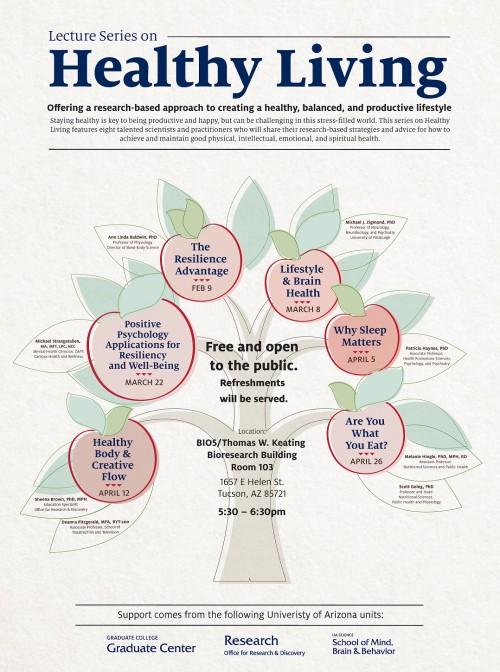College is hard.
Between classes, work, extra curricular activities and a social life, there’s barely enough time left for basic personal hygiene and maybe a couple of hours of sleep.
This chaos causes students to often leave their health on the metaphorical back burner, if it’s even on their minds at all. The UA’s Graduate Center understands this problem better than anyone.
The center designed a six-part lecture series about healthy living based on scientific research to help combat unhealthy habits.
The series is currently running and emphasizes a different aspect of healthy living in each installment, with topics ranging from psychology to the importance of sleep and nutritional health.
The most recent segment of the series, which featured on Tuesday, focused on positive psychology—a newer branch of psychology that prefers to study the beneficial habits of healthy people—rather than the detrimental habits and symptoms that lead to disease and disorders.
Students are in the homestretch to finals and the end of the year. Adopting healthier lifestyles can help students survive until summer and then prepare for school again next semester.
Michael Strangstalien, a mental health clinician and counselor at UA Counseling and Psych Services, made the most out of the lecture’s designated hour by covering a wide range of material about positive psychology and how to incorporate it into your life or, as he put it, how to “flourish.”
One of the biggest themes of the night stressed not trying to figure out how to stay happy all of the time or how to avoid setbacks. Instead, Strangstalien emphasized that the healthiest way to live is by embracing your setbacks and learning how to bounce back from them. It’s healthy to acknowledge unhappy events, but he encourages students to strive to keep moving forward.
Strangstalien also encouraged people to find ways to be enthusiastic about life, even the parts of it that aren’t necessarily thrilling all the time, like when his dogs are overjoyed to go on the same walk every day.
“Really where it came from was thinking of graduate students and postdoctoral fellows and people in those kinds of situations that are under that kind of stress, but you know all of us are,” said interim faculty director of the Graduate Center and speech, language and hearing sciences professor Jenny Hoit. “Everybody’s under stress and how can we deal with this, how can we have the most fulfilling life possible?”
Many of the themes from the talk have connections to branches of philosophy and the recurring idea that a most desirable you exists somewhere, living your most desirable life. These fields, including positive psychology and some branches of moral philosophy, are designed to try to figure out the best way to get there.
“The cool thing about this series is that it’s all research-based approaches to healthy living, which is really important … to hear these different ideas that are research-based that have actual findings associated with them and results that are verifiable,” said Program Coordinator for the Graduate Center David Bradshaw. “Everything you’ll hear in this series is verifiable by studies done by the speakers.”
While living, working and learning in such a fast-paced culture where everyone is doing something and no one is doing nothing, it is easy to get swept up in the bedlam. Hoit advised students to always keep an open mind about what they’re doing and to never let a generic, cookie-cutter template control their lives.
“You’re the only one who really knows what you need to do for yourself and where you’re going,” Hoit said.
This advice applies to dealing with individual health as well. While everyone handles stress, anxiety and depression differently, it never hurts to take a step back and think about how you’re treating yourself, because nothing is worth sacrificing your health and well being.
This lecture series has something everyone can benefit from.
“We’re talking about diet, we’re talking about exercise, we’re talking about the brain, we’re talking about positive psychology, resilience,” said Hoit. “A lot of graduate students have a lot of stress, ending up in a lot of medical problems, psychological problems, physical problems and I see it all the time.”
Students may not consciously realize the destructive ramifications of habits that have become commonplace in a competitive academic environment. Making just a few small changes can help. One change that can help is meditation.
“We don’t have to shave our heads and get a brown robe,” said Strangstalien. “Neuroscience has shown 10 minutes of being able to focus in the moment has an effect.”
The lecture was not without a few old, tired cliches, like being your own cheerleader, finding “luck” by proactively putting yourself in lucky situations and, of course, the pinnacle of positive psychology: the famous and debatable pyramid of self-actualization. The interesting and applicable aspects of the talk were worth a few eye rolls overall.
Part four of the lecture series, given by Patricia Haynes, an associate professor in Health Promotion Sciences, will discuss why sleep matters. Haynes is a clinical psychologist with expertise in sleep psychology. The lecture will be held on April 5 at 5:30 p.m. in room 103 of the Thomas W. Keating Bioresearch building.
Follow Casey Aldava on Twitter.









